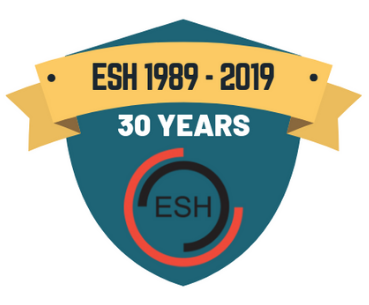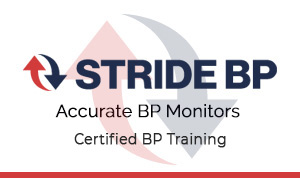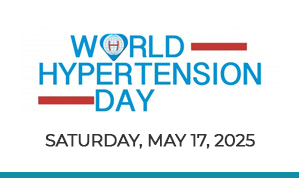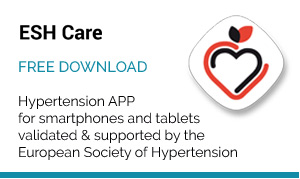Hypertension 2008
Interpreting the ACCOMPLISH ResultsThe traditional approach to hypertension management is to initiate monotherapy then sequentially add medications to achieve target blood pressure (BP). Since most clinical trials suggest that the majority of patients will require at least two drugs to achieve blood pressure goals, theAvoiding Cardiovascular Events Through Combination Therapy in Patients Living with Systolic Hypertension (ACCOMPLISH) trial evaluated the initiation of single-tablet combination therapy in high-risk hypertension.
Prof. Kenneth Jamerson, Essen (Germany), presented ACCOMPLISHresults and Prof. Michael A. Weber, New York (USA), reviewed early lessons from the blood pressure and outcomes data. Dr. Weber also interpreted the results of ACCOMPLISH in context with the results of other major hypertension trials.
ACCOMPLISH Results
Investigators enrolled 11,462 patients, 55 years of age or older, who are at high risk of cardiovascular events based on evidence of cardiovascular disease, renal disease, or target organ damage. (1) Nearly two-thirds of the ACCOMPLISH trial participants had high blood pressure at baseline despite significant medical management. (2)
The study evaluated the addition of the ACE inhibitor (ACEI) benazepril (20 mg) to either the calcium channel blocker (CCB) amlodipine (5 mg) or the diuretic hydrochlorothiazide (HCTZ, 12.5 mg). Subsequently, if the patient did not achieve target blood pressure levels, doses could be doubled (if tolerated) and additional antihypertensive therapy added after 3 months to achieve target BP levels in patients with diabetes or renal insufficiency.
Overall, initial fixed-dose combinations produced remarkable BP control rates including difficult-to-treat patient subgroups such as those with diabetes or chronic kidney disease. The 6-month BP control rate of 73% in the overall trial was the highest of any multinational trial. (3) Interestingly, 50% of participants required only one tablet (i.e., no increase in dosage to meet target BP).
The primary endpoint was cardiovascular morbidity and mortality defined as cardiovascular death, nonfatal MI, stroke, hospitalization for unstable angina, coronary revascularization, or resuscitated sudden death. The trial was terminated early with evidence of a 20% risk reduction for the primary endpoint favoring the ACEI/CCB combination (p = 0.0002 compared to ACEI/HCTZ). The hard cardiovascular endpoint of cardiovascular death, stroke, and MI also was reduced by 20% (p = 0.007) with ACEI/CCB therapy.
Interpreting ACCOMPLISH
Dr. Weber was first author of the VALUE trial, which showed the benefit of tight BP control, independent of drug type, based on significant benefits for subsequent major outcomes. (4) In the VALUE study, patients received either angiotensin receptor blocker-based therapy (valsartan) or amlodipine-based therapy (each combined with a thiazide). In his Hypertension 2008 presentation, Dr. Weber noted that ACCOMPLISH was even more effective in achieving BP targets than evident in the VALUE trial. “ACCOMPLISH now establishes a new and potentially superior approach,” he said: a renin-angiotensin system (RAS) blocker plus amlodipine.
In ASCOT, the combination of ACEI/amlodipine was superior to dual therapy with a beta-blocker/thiazide. (5) The popular explanation for this difference, he said, was that the beta-blocker failed to adequately reduce central (aortic) BP. But have we blamed the wrong drug? “In view of ACCOMPLISH,” said Dr. Weber, “the results of ASCOT could be explained, at least in part, by the superiority of amlodipine over the thiazide.”
The ACCOMPLISH data also challenge the ALLHAT conclusions. (6) Based largely on ALLHAT, JNC-7 guidelines recommend thiazides as first-line therapy, but the comparison in ALLHAT was based on frequent use of a beta-blocker as the second drug. ACCOMPLISH, said Dr. Weber, using “more rational combinations,” suggests that amlodipine is clearly superior to thiazide-like drugs, “bringing ALLHAT’s interpretation – and guidelines – into question.”
Finally, Dr. Weber reviewed evidence that amlodipine appears to possess important vasoprotective properties that make it highly appropriate for use in combination with a RAS blocker. “Future guidelines recommendations in hypertension drug therapy must therefore reconsider the roles of amlodipine and diuretics, perhaps now favoring amlodipine,” he said.
References:
- Jamerson KA, Bakris GL, Wun CC, et al. Rationale and design of the avoiding cardiovascular events through combination therapy in patients living with systolic hypertension (ACCOMPLISH) trial: the first randomized controlled trial to compare the clinical outcome effects of first-line combination therapies in hypertension. Am J Hypertens 2004;17:793-801.
- Weber MA, Bakris GL, Dahlöf B, et al. Baseline characteristics in the Avoiding Cardiovascular events through Combination therapy in Patients Living with Systolic Hypertension (ACCOMPLISH) trial: a hypertensive population at high cardiovascular risk. Blood Press 2007;16:13-9.
- Jamerson K, Bakris GL, Dahlöf B, et al. Exceptional early blood pressure control rates: the ACCOMPLISH trial. Blood Press 2007;16:80-6.
- Weber MA, Julius S, Kjeldsen SE, et al. Blood pressure dependent and independent effects of antihypertensive treatment on clinical events in the VALUE Trial. Lancet 2004;363:2049-51.
- Dahlöf B, Sever PS, Poulter NR, et al. Prevention of cardiovascular events with an antihypertensive regimen of amlodipine adding perindopril as required versus atenolol adding bendroflumethiazide as required, in the Anglo-Scandinavian Cardiac Outcomes Trial-Blood Pressure Lowering Arm (ASCOT-BPLA): a multicentre randomized controlled trial. Lancet 2005;366:895-906.
- ALLHAT Officers and Coordinators for the ALLHAT Collaborative Research Group. The Antihypertensive and Lipid-Lowering Treatment to Prevent Heart Attack Trial. Major outcomes in high-risk hypertensive patients randomized to angiotensin-converting enzyme inhibitor or calcium channel blocker vs diuretic: The Antihypertensive and Lipid-Lowering Treatment to Prevent Heart Attack Trial (ALLHAT). JAMA 2002;288:2981-97.





